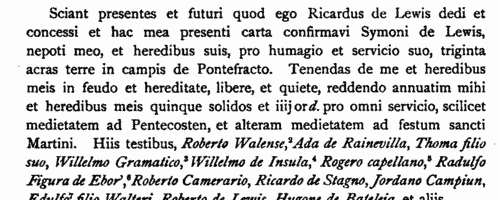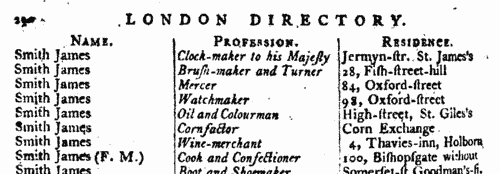Darton Surname Ancestry ResultsOur indexes 1000-1999 include entries for the spelling 'darton'. In the period you have requested, we have the following 88 records (displaying 1 to 10): Single Surname Subscription | | | Buying all 88 results of this search individually would cost £486.00. But you can have free access to all 88 records for a year, to view, to save and print, for £100. Save £386.00. More... |
These sample scans are from the original record. You will get scans of the full pages or articles where the surname you searched for has been found. Your web browser may prevent the sample windows from opening; in this case please change your browser settings to allow pop-up windows from this site. Pontefract Cartulary
(1100-1300)
The Cluniac monastery of St John the Evangelist at Pontefract (Pomfret) in the West Riding of Yorkshire, was founded in the 11th century by Robert de Lascy. The grants of land made to the priory from then well into the 13th century were copied into a cartulary or chartulary which eventually came to Godfrey Wentworth of Woolley Park. This was edited by Richard Holmes and published by Yorkshire Archaeological Society in 1899 and 1902. The individuals named are mainly local landowners and tenants, canons, servants and wellwishers of the monastery. The charters before 1250 are often undated: the numbering of the charters is modern, and amounts to 561. The cartulary itself contains 11 fasciculi, to which Holmes gave these section names - I. The Seigniorial Charters; II. The Ecclesiastical Charters; III. Royal Charters and Confirmations; IV. The Local Charters (Pontefract &c.); V. The Ledstone Charters; VI. The Ledsham Charters; VII. Miscellaneous Charters; VIII. The Peckfield and other Charters; IX. and X. Scarborough and other Charters; and XI. Leases to Tenants. Ledston(e), Ledsham and Peckfield are all close to Pontefract, as is most of the property.DARTON. Cost: £4.00.  | Sample scan, click to enlarge

| Tradesmen of York
(1272-1558)
No man or woman could trade in the city of York without having obtained 'freedom' of the city.Their names were recorded on the 'Freemen's Roll', or Register of the Freemen of the City of York, which contains about 19,900 names for this period. A list of names was prepared for each year, the year being here reckoned as starting at Michaelmas (29 September) until 1373, and thence at Candlemas (2 February). Each annual list starts with the name of the mayor and the camerarii or chamberlains. The chamberlains were freemen charged with the duty of receiving the fees of the new freemen; of seeing that only freemen traded in the city; and of preparing this roll, which was compiled from the names on their own account books from the receipts for the fees. There are three groups of freemen: those who obtained freedom after serving out an apprenticeship to a freeman; the children of freemen; and those who claimed freedom by 'redemption', i. e. by purchase or gift from the Mayor and Court of Aldermen.
DARTON. Cost: £2.00.  | Sample scan, click to enlarge

|  Masters of Apprentices registered in Cornwall
(1723-1726) Masters of Apprentices registered in Cornwall
(1723-1726)
Apprenticeship indentures and clerks' articles were subject to a 6d or 12d per pound stamp duty: the registers of the payments usually give the master's trade, address, and occupation, and the apprentice's father's name and address, as well as details of the date and length of the apprenticeship. There are central registers for collections of the stamp duty in London, as well as returns from collectors in the provinces. These collectors generally received duty just from their own county, but sometimes from further afield. Because of the delay before some collectors made their returns, this register includes indentures and articles from as early as 1722. (The sample entry shown on this scan is taken from a Norfolk return)DARTON. Cost: £8.00.  | Sample scan, click to enlarge

|  Apprentices registered at Plymouth in Devon
(1750-1754) Apprentices registered at Plymouth in Devon
(1750-1754)
Apprenticeship indentures and clerks' articles were subject to a 6d or 12d per pound stamp duty: the registers of the payments usually give the master's trade, address, and occupation, and the apprentice's father's name and address, as well as details of the date and length of the apprenticeship. There are central registers for collections of the stamp duty in London, as well as returns from collectors in the provinces. These collectors generally received duty just from their own county, but sometimes from further afield. (The sample entry shown on this scan is taken from a Norfolk return)DARTON. Cost: £8.00.  | Sample scan, click to enlarge

|  Apprentices and articled clerks
(1765) Apprentices and articled clerks
(1765)
Apprenticeship indentures and clerks' articles were subject to a 6d or 12d per pound stamp duty (late payment of the 6d rate attracted double duty (D D) of 12d): the registers of the payments usually give the master's trade, address, and occupation, and the apprentice's name, as well as details of the date and length of the apprenticeship. 2 January to 31 December 1765.DARTON. Cost: £8.00.  | Sample scan, click to enlarge

|  Apprentices
(1768) Apprentices
(1768)
Apprenticeship indentures and clerks' articles were subject to a 6d or 12d per pound stamp duty (late payment of the 6d rate attracted double duty (D D) of 12d): the registers of the payments usually give the master's trade, address, and occupation, and the apprentice's name, as well as details of the date and length of the apprenticeship. 1 January to 3 December 1768.DARTON. Cost: £8.00.  | Sample scan, click to enlarge

|  Apprentices
(1769) Apprentices
(1769)
Apprenticeship indentures and clerks' articles were subject to a 6d or 12d per pound stamp duty (late payment of the 6d rate attracted double duty (D D) of 12d): the registers of the payments usually give the master's trade, address, and occupation, and the apprentice's name, as well as details of the date and length of the apprenticeship. 2 January to 31 December 1769.DARTON. Cost: £8.00.  | Sample scan, click to enlarge

|  Masters of Apprentices registered in Devonshire
(1777) Masters of Apprentices registered in Devonshire
(1777)
Apprenticeship indentures and clerks' articles were subject to a 6d or 12d per pound stamp duty: the registers of the payments usually give the master's trade, address, and occupation, and the apprentice's name, as well as details of the date and length of the apprenticeship. There are central registers for collections of the stamp duty in London, as well as returns from collectors in the provinces. These collectors generally received duty just from their own county, but sometimes from further afield. The indentures themselves can date from a year or two earlier than this return. (The sample entry shown on this scan is taken from a Bristol return. Each entry has two scans, the other being the facing page with the details of the indenture, length of service, and payment of duty.) IR 1/60DARTON. Cost: £8.00.  | Sample scan, click to enlarge

|  Masters of clerks and apprentices
(1788) Masters of clerks and apprentices
(1788)
Apprenticeship indentures and clerks' articles were subject to a 6d or 12d per pound stamp duty: the registers of the payments usually give the master's trade, address, and occupation, and the apprentice's name, as well as details of the date and length of the apprenticeship. 2 January to 23 August 1788. IR 1/33DARTON. Cost: £8.00.  | Sample scan, click to enlarge

| Traders and Merchants in London
(1791)
The Universal British Directory was published in five volumes, starting in 1791. The professions included in the London section are very diverse: the addresses are mostly from central London. Some are marked 'F. M.', meaning Freeholder of Middlesex.DARTON. Cost: £6.00.  | Sample scan, click to enlarge

|
Research your ancestry, family history, genealogy and one-name study by direct access to original records and archives indexed by surname.
|













